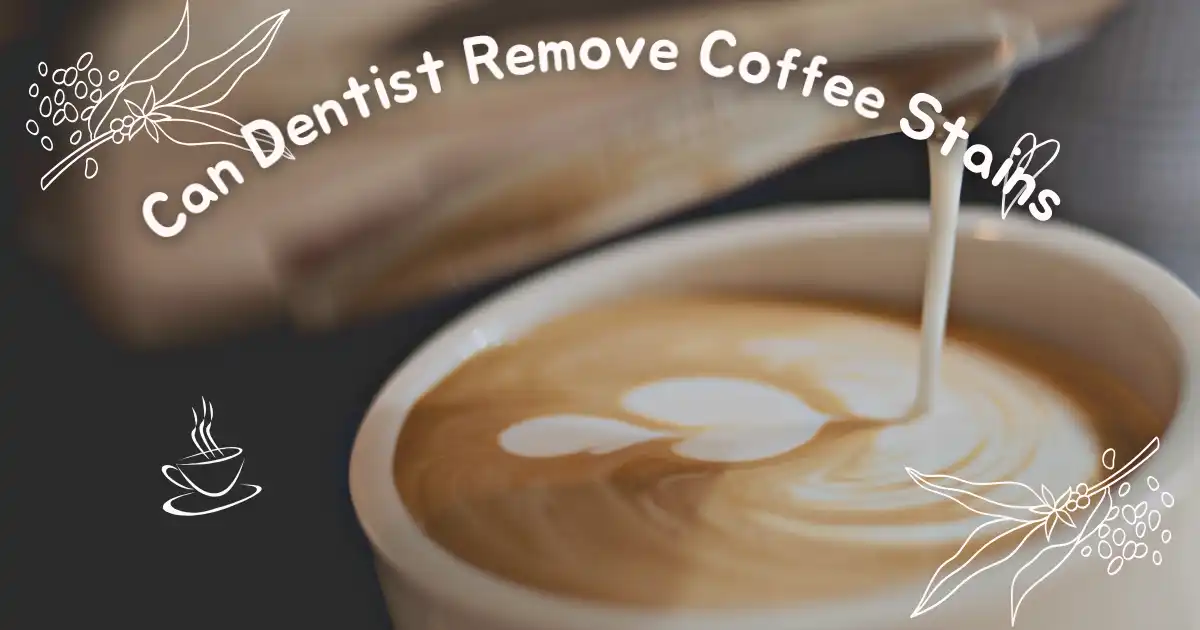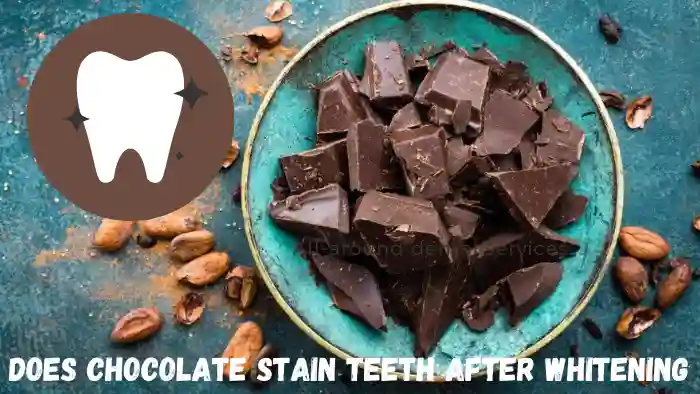A captivating smile holds immense power, radiating confidence and charm. Yet, the love for a comforting cup of coffee can leave unsightly stains on our teeth, dampening our self-assurance. Can dentists remove coffee stains? Can Dentist Remove Coffee Stains?
In this exploration, we uncover the transformative techniques that allow dentists to erase these stains, restoring the brilliance of our smiles. Prepare for a journey into the remarkable abilities of dentistry as we unveil the secrets behind a dentist’s skill to rejuvenate your smile, leaving you with an awe-inspiring and stain-free grin.
Understanding Coffee Stains:
Coffee contains chromogenic pigments that can adhere to the tooth enamel and cause discolouration. Over time, these pigments can penetrate the porous structure of the enamel, making it more challenging to remove the stains. Regular brushing and dental hygiene practices may help minimize the impact of coffee stains, but they may not be sufficient to eliminate them.
Professional Teeth Cleaning:
One of the most common ways dentists tackle coffee stains is through professional teeth cleaning. During a dental cleaning, a dentist or dental hygienist will use specialized instruments and techniques to remove plaque, tartar, and surface stains from the teeth. This procedure, known as scaling and polishing, can effectively remove coffee stains and restore the natural whiteness of your teeth.
Pros:
- Professional expertise: Dentists have the knowledge and expertise to effectively remove coffee stains from teeth. They can assess the severity of the stains and recommend appropriate treatment options for optimal results.
- Comprehensive cleaning: Through professional teeth cleaning, dentists can remove not only coffee stains but also plaque, tartar, and other surface stains, improving overall oral health.
- Customized treatment: Dentists can tailor the treatment to your specific needs. They can recommend in-office or home-based teeth whitening options based on the severity of the stains and your preferences.
- Long-lasting results: Teeth whitening procedures performed by dentists can provide long-lasting results, lightening the colour of your teeth and significantly reducing coffee stains.
- Improves confidence: Removing coffee stains can enhance the appearance of your teeth, boosting your confidence and allowing you to smile without hesitation.
Cons:
- Cost: Professional teeth cleaning and whitening procedures are more expensive than over-the-counter. The fee may vary depending on the extent of the stains and the chosen treatment option.
- Sensitivity: Some individuals may experience temporary tooth sensitivity or gum irritation after teeth whitening procedures. However, these side effects are generally mild and resolve on their own.
- Multiple sessions: Achieving desired results may require multiple sessions, particularly for severe or deeply embedded coffee stains. This can be time-consuming, especially for in-office whitening procedures.
- Maintenance: While the effects of teeth whitening can be long-lasting, it is crucial to maintain good oral hygiene and avoid excessive coffee consumption or other staining agents to prevent new stains from forming.
- Not suitable for all cases: Sometimes, coffee stains may be too severe or resistant to traditional teeth whitening methods. In such cases, cosmetic dentistry options like dental veneers or bonding may be necessary, which involve additional costs and procedures.
Teeth Whitening Procedures
In cases where coffee stains are more severe or persistent, dentists may recommend teeth whitening procedures to achieve optimal results. Teeth whitening can be performed in-office or at home under the guidance of a dentist.
In-office teeth whitening procedures often involve the application of a bleaching agent directly to the teeth. The dentist will use protective measures to shield your gums and apply the whitening agent, which breaks down the coffee stains and lightens the colour of your teeth. This process usually takes one to two hours and may require multiple sessions for significant stain removal.
Home-based teeth whitening options dentists provide usually involve custom-made whitening trays and professional-grade bleaching agents. The dentist will provide instructions on using the trays and the recommended duration for optimal results. Home-based whitening typically takes longer to achieve the desired outcomes than in-office procedures.
Other Cosmetic Dentistry Options:
Sometimes, coffee stains may be too stubborn to remove through regular cleaning or whitening procedures. In such instances, dentists may recommend alternative cosmetic dentistry options to improve the appearance of your teeth. These options may include dental veneers or dental bonding.
Dental veneers are thin shells made of porcelain or composite resin that are custom-made to fit over the front surface of the teeth. Veneers can effectively cover coffee stains and provide a naturally white and attractive smile.
Dental bonding involves applying a tooth-coloured composite resin material to the stained tooth. The resin is then shaped and polished to match the natural appearance of the surrounding teeth, effectively concealing the coffee stains.
Preventing Coffee Stains:
While dentists can help remove coffee stains, prevention is always better than cure.
Here are some tips to minimize coffee stains on your teeth:
- Use a straw: Drinking coffee through a straw can help minimize direct contact between the coffee and your teeth, reducing the chances of stains.
- Rinse your mouth: After consuming coffee, rinse your mouth with water to wash away any residual coffee particles.
- Brush and floss regularly: Maintaining good oral hygiene by brushing and flossing regularly can help remove surface coffee stains and prevent them from becoming more embedded.
- Professional cleanings: Visit your dentist regularly to remove coffee stains and maintain optimal oral health.
Are Coffee Stains on Teeth Permanent?
Coffee is one of the most consumed drinks in the world, but over time, it can discolour teeth. However, these stains are not necessarily permanent and can be reduced or removed with proper oral care and professional treatments.
Coffee contains tannins, compounds that cause discolouration by adhering to the porous enamel surface of teeth. As you consume more coffee, these stains accumulate, giving teeth a yellowish or brownish tint.
Fortunately, coffee stains on teeth are extrinsic, meaning they occur on the outer surface of the enamel.
This makes them more responsive to various stain removal methods than intrinsic stains that penetrate deeper into the tooth structure.
To combat coffee stains, maintain good oral hygiene habits like brushing twice daily with a whitening toothpaste and flossing regularly. These practices help remove surface stains and prevent further discolouration.
Professional teeth whitening treatments and in-office or at-home kits prescribed by dentists can effectively lift stubborn coffee stains. These treatments use bleaching agents like hydrogen or carbamide peroxide to break down and remove extrinsic stains.
Additionally, avoiding habits like smoking and limiting consumption of other staining foods and beverages can help prevent further staining and maintain a brighter smile.
While coffee stains may seem persistent, they are not permanent and can be addressed with consistent oral care and professional whitening treatments when needed.
Are Coffee Stains On Teeth Permanent?
Coffee, a beloved beverage for many, can leave unsightly stains on teeth over time. However, these stains are not permanent and can be removed or reduced with proper oral care and professional treatments.
Coffee contains tannins, compounds that adhere to the porous enamel surface of teeth, causing discolouration. As you consume more coffee, these stains accumulate, giving teeth a yellowish or brownish tint.
The good news is that coffee stains on teeth are extrinsic, meaning they occur on the outer surface of the enamel. This makes them more responsive to various stain removal methods than intrinsic stains that penetrate deeper into the tooth structure.
To combat coffee stains, practice good oral hygiene habits like brushing twice daily with a whitening toothpaste and flossing regularly. These practices help remove surface stains and prevent further discolouration.
Coffee stains are efficiently lifted by professional teeth whitening procedures, such as in-office bleaching or take-home kits recommended by dentists. Extrinsic stains are broken down and removed by these procedures using bleaching agents such as hydrogen peroxide or carbamide peroxide.
Additionally, limiting the consumption of other staining foods and beverages and avoiding habits like smoking can help prevent further staining and maintain a brighter smile.
While coffee stains may seem persistent, they are not permanent and can be addressed with consistent oral care and professional whitening treatments when needed. Remember, a radiant smile is achievable with the right approach.
Can My Dentist Remove Stains?
Unattractive teeth stains can cause you to feel self-conscious when you smile. While at-home whitening kits can be beneficial, deeply ingrained or difficult-to-remove stains might respond poorly to them. This is where your dentist can help since they have the knowledge and high-quality procedures to remove even the most tenacious stains successfully.
During a dental appointment, your dentist will evaluate the type and severity of your teeth stains. They can then recommend the most suitable treatment option, which may include:
- Professional teeth whitening: Dentists use powerful bleaching agents like hydrogen or carbamide peroxide to break down and lift stains from the enamel surface.
- Dental cleaning: A professional cleaning removes built-up plaque and tartar, which can contribute to staining.
- Veneers or bonding: For severe staining or discolouration, your dentist may recommend covering the affected teeth with veneers or dental bonding to achieve a brighter, more uniform smile.
- Microabrasion: This technique removes a microscopic enamel layer to eliminate deep-set stains.
In addition to providing effective stain removal treatments, your dentist will advise you on maintaining your bright smile by recommending lifestyle changes, oral hygiene practices, and products tailored to your needs.
Don’t allow stains to prevent you from grinning with assurance. Please make an appointment with your dentist so they can use their modern technology and professional knowledge to restore the brightness of your teeth.
Can Dentists Remove Brown Stains?
Brown stains on teeth can be unsightly and difficult to remove with over-the-counter whitening products. However, dentists can access professional-grade treatments that eliminate even the most stubborn brown stains.
During a dental appointment, your dentist will first evaluate the type and severity of the brown stains.
Professional teeth whitening:
Dentists use powerful bleaching agents like hydrogen or carbamide peroxide to break down and lift brown stains from the enamel surface.
Air abrasion:
This method softly removes surface stains and discolourations with a spray of small particles.
Microabrasion:
For more profound, more stubborn brown stains, your dentist may recommend microabrasion, which involves removing a microscopic layer of enamel to reveal a brighter tooth surface.
Veneers or bonding:
In severe discolouration or intrinsic stains, your dentist may suggest covering the affected teeth with veneers or dental bonding to achieve a uniform, stain-free smile.
In addition to these treatments, your dentist will provide personalized guidance on maintaining your bright smile. This may include recommendations for lifestyle changes,
Don’t let unsightly brown stains rob you of your confidence. Trust your dentist to restore the radiance of your teeth with their professional expertise and advanced techniques designed to remove even the most stubborn stains effectively.
Frequently Asked Questions
How does professional teeth cleaning help remove coffee stains?
Professional teeth cleaning involves scaling and polishing, effectively removing plaque, tartar, and surface stains, including coffee stains, from the teeth.
What are the teeth whitening procedures offered by dentists?
Dentists offer in-office teeth whitening, where a bleaching agent is applied to the teeth to break down coffee stains. They also provide home-based teeth whitening kits with custom-made trays and professional-grade bleaching agents.
Can home-based teeth whitening kits remove coffee stains effectively?
Yes, home-based teeth whitening kits provided by dentists can gradually remove coffee stains over time. However, they may take longer to achieve desired results compared to in-office procedures.
Are there any other cosmetic dentistry options to remove coffee stains?
Dentists may recommend dental veneers or bonding if coffee stains are severe or persistent. Veneers are thin shells placed over the teeth, while bonding involves applying a tooth-coloured resin material to cover the stains.
How long does it take to remove coffee stains with teeth whitening procedures?
The time required to remove coffee stains with teeth whitening procedures can vary. In-office whitening sessions usually last one to two hours, while home-based kits may require several weeks for noticeable results.
Can coffee stains be prevented altogether?
While it’s challenging to prevent coffee stains completely, you can minimize their impact by using a straw, rinsing your mouth after consuming coffee, practising good oral hygiene, and visiting the dentist regularly for cleanings.
Are there any side effects associated with teeth whitening procedures?
Teeth whitening procedures may cause temporary tooth sensitivity or gum irritation. However, these side effects are usually mild and subside after the treatment.
Are there any side effects associated with teeth whitening procedures?
Teeth whitening procedures may cause temporary tooth sensitivity or gum irritation. However, these side effects are usually mild and subside after the treatment.
Will teeth whitening procedures make my teeth completely white?
Teeth whitening procedures can significantly lighten the colour of your teeth, including coffee stains. However, the final results may vary depending on factors such as the severity of the stains and individual tooth characteristics.
How long do the effects of teeth whitening last?
The longevity of teeth whitening effects depends on various factors, including oral hygiene habits and dietary choices. With proper care, teeth whitening results can last for several months to a few years before a touch-up may be needed.

A Blogger, Author and Researcher! Gohar Aalam is recognized as a full-time blogger for Health and Tech Niches. I’m a Fountainhead of Gethealthup.com, will provides high quality knowledge.








